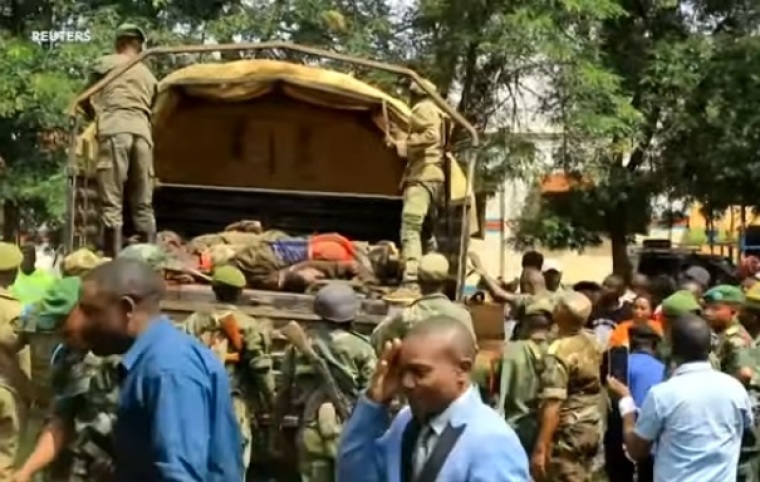 Congolese security forces load dead bodies of rebel militants onto a truck after repelling an attack on a village near the city of Beni in May 2019. | YouTube/VOA News
Congolese security forces load dead bodies of rebel militants onto a truck after repelling an attack on a village near the city of Beni in May 2019. | YouTube/VOA NewsAt least 57 people were killed this week in attacks carried out by an Islamic rebel group in the northeast Democratic Republic of Congo as escalating violence near the Ugandan border has displaced hundreds of thousands of people so far this year.
The Centre for the Promotion of Peace, Democracy and Human Rights said in a statement that Islamic rebels attacked Samboko, Bandavilemba and Walese-Vukutu villages in Ituri province on Tuesday, killing 40, according to The Associated Press.
Attacks on villages have been attributed to members of the Allied Democratic Forces and a group known as MTM, which claims to be affiliated with the Islamic State terror faction. According to the news agency, the two groups have begun carrying out attacks together.
The latest attacks follow a separate attack on Monday that was attributed to ADF, an Islamist rebel group that was driven out of Uganda in the late 1990s but has operated in eastern DRC and resurged in recent years. A military offensive was launched against the group’s bases last year.
A source told Reuters that ADF launched an early morning attack on civilians in the village of Makutano in Ituri.
“They fired several shots in the air. When the population was fleeing, they captured some people and cut them up with machetes,” Gili Gotabo, a civil society leader in the Irumu territory, said of the Monday attack.
The Kivu Security Tracker, a research initiative that monitors violence in the region, reported that at least 17 were killed in Monday's attack. However, Gotabo told Reuters that there are likely to be more deaths.
ADF has been blamed for killing hundreds of people since the offensive began last year.
After a sharp decline of violent deaths in March, the Kivu Security Tracker shows an uptick in attacks in the region over the last two months.
The U.N.'s Children's Fund reported last week that over a quarter-million people, most of whom are children, have been forced to flee violence in Ituri since the beginning of the year.
The agency said that 22 health facilities have been destroyed and 160 schools have been damaged or looted.
UNICEF stressed in its May 20 report that 25,000 newly displaced people have gone into IDP camps and are struggling to access safe water and sanitation. The U.N. Refugee Agency estimates that over 5 million people were displaced in-country between October 2017 and September 2019, with over 900,000 refugees and asylum seekers in host countries.
According to UNICEF, the new displacements put “further pressure on already stretched humanitarian services in one of the poorest, most insecure and disease-stricken parts of the country.”
“Even before the new influx, displaced people could only access five liters of water per day — far below the recommended daily minimum,” the report says.
From three areas — Djugu, Mahagi and Irumu — UNICEF notes that about 200,000 people are seeking shelter in host communities or at “extremely overcrowded displacement sites” in and around Ituri’s capital of Bunia since December 2019.
“The humanitarian situation in Djugu area is especially precarious as 70 percent of humanitarian workers have had to suspend operations due to the worsening security context,” the UNICEF report adds.
Edouard Beigbeder, a UNICEF representative in the DRC, said the “security situation in Ituri is deteriorating fast.”
“We need to act equally quickly to avert a crisis that would forcibly uproot and endanger even more children,” Beigbeder warned in a statement.
The conflict between rebels and security services come as a conflict between farming and herding communities in the region has also led the killings of 701 people between December 2017 and September 2019 in Djugu and Mahagi, according to a U.N. investigation.
Violence and mass displacement has effected millions across Central and West Africa, including those that have been displaced or killed by extremist or rebel attacks in countries such as Nigeria, Cameroon and Burkina Faso. Escalating Islamic terrorism in the southeast African country of Mozambique has also led to the displacement of over 100,000 people.
.jpeg)